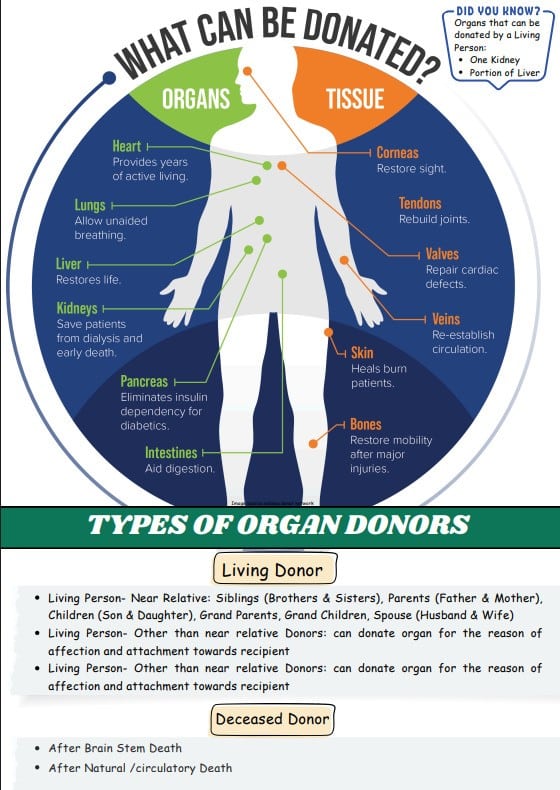World Organ Donation Day: Here’s what you need to know
India's organ donation rate stands at just 0.6–0.7 per million people, far below global leaders like Spain (52.6 pmp) and the US (44.5 pmp)
Author
Author
- admin / 6 months

- 0
- 4 min read

Author
India’s organ transplantation numbers have reached a record high, yet the need still far outweighs the supply. Speaking at the 15th Indian Organ Donation Day earlier this month, Union Health Minister Jagat Prakash Nadda announced that the country performed over 18,900 organ transplants in 2024 — the highest ever in a single year, and a steep climb from fewer than 5,000 in 2013. This achievement places India third in the world for total transplants, behind only the United States and China.
However, the picture is not without concern. The country’s organ donation rate stands at just 0.6–0.7 per million people, far below global leaders like Spain (52.6 pmp) and the US (44.5 pmp). With over 2.5 lakh people needing kidneys, 80,000 requiring livers, and 50,000 in need of hearts every year, the gap between those waiting and those receiving transplants remains alarmingly wide.
Observed annually on August 13, World Organ Donation Day is a reminder of how a single decision can save multiple lives — and why awareness, pledging, and family conversations are essential to bridging this gap.
Here are the essential facts and answers to the most common questions.
What is organ donation?
Organ donation is the act of giving an organ to someone suffering from end-stage organ failure, offering them a chance at life through transplantation. Donations can be made by living donors, who can give one kidney, a part of the liver, or a portion of the pancreas during their lifetime, or by deceased donors, whose organs and tissues can be retrieved after brain-stem death or cardiac death.
Organs that can be donated include the heart, lungs, liver, kidneys, pancreas, and intestine. Tissues such as cornea, skin, bone, heart valves, blood vessels, cartilage, and tendons can also be donated.
What is an organ transplant?
An organ transplant is a surgical procedure where a failing or damaged organ is replaced with a healthy one from a donor. For the transplant to be possible, the organ must come from another person — either living or deceased. In the case of deceased donation, timing is critical to ensure the organ remains viable.

Who can donate organs?
Anyone, regardless of age, race, or gender, can register as a donor. Medical suitability is determined at the time of donation by specialist healthcare professionals. In India, for living donation, the donor must be at least 18 years old and in good health. In India, near relatives (parents, siblings, children, grandparents, grandchildren, and spouse) can donate directly; others can donate for reasons of affection or attachment, subject to approval.
For deceased donation, organs can be retrieved with the consent of the next of kin or a lawful custodian of the body. Even people in their 70s or 80s have successfully donated certain organs and tissues.
What can be donated and at what age?
Organs:
- Kidney and liver – up to 70 years
- Heart and lungs – up to 50 years
- Pancreas and intestine – up to 60–65 years
Tissues:
- Corneas and skin – up to 100 years
- Heart valves – up to 50 years
- Bone – up to 70 years
For living donation, age and health are considered, but suitability depends more on the condition of the organ than the donor’s chronological age.
How can you register as an organ donor in India?
Anyone above 18 can pledge online via the NOTTO portal using Aadhaar-based OTP verification. Offline pledging is possible by filling Form 7 and sending it to NOTTO’s office in New Delhi. A donor card will be issued, and it’s advisable to carry it and inform your family.
Can people with medical conditions donate?
Yes, most existing medical conditions do not automatically disqualify a person from donating. The decision depends on the donor’s medical history and the condition of each organ or tissue. In rare cases, organs from donors with HIV or hepatitis-C have also been used to help recipients with the same condition, under strict medical protocols.
Also read: World Organ Donation Day: The top 5 myths around organ donation
(Do you have a health-related claim that you would like us to fact-check? Send it to us, and we will fact-check it for you! You can send it on WhatsApp at +91-9311223141, mail us at hello@firstcheck.in, or click here to submit it online)










